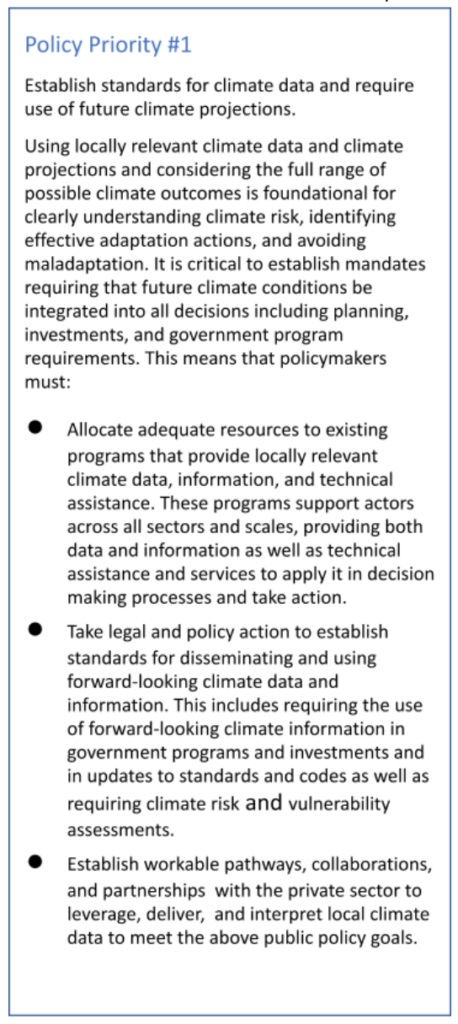American Society of Adaptation Professionals’ Policy Priority #1 Action Plan
Priority #1 is to Establish Standards for Climate Data and Require use of Future Climate Projections.
As part of the 2022 goals for the Policy Practice Member-Led Interest Group (“PPG”) a series of meetings are planned to address each of the American Society of Adaptation Professionals’ (“ASAP”) policy priorities and develop actionable plans to be more proactive in advocating for climate-related policies.
Examples of proactive activities would include support of bills at the state and federal level, using key messages about ASAP priorities in conversations with elected officials, developing material for members to use when advocating for policy and sharing priorities with partners.

To aid in discussions about Policy Priority #1, the April 2022 meeting included speakers who could discuss action around data integration and use of climate data and policy. The speakers were:
- Eric Burnstein from Urban Institute and co-author of the recent Urban Institute/Pew report State Flood Resilience and Adaptation Planning: Challenges and Opportunities.
- Kelsey Ducklow from California Coastal Commission will speak on how standards and projections were handled in the development of California’s sea level rise planning guidance.
- David Herring with NOAA’s US Global Change Research Program and co-chair of Federal Adaptation and Resilience Group.
In the following meeting, PPG facilitated small group discussions broken into federal, state, and local interests. This document summarizes the discussion and key takeaways from the facilitated discussions. The following list of actions is derived from the discussions within the small groups.
Action Plan
The action plan for policy priority one was divided into three sections, federal, state, and local. The reason for this division is the need for locally relevant data and the ability for each sector to either provide data or incentive the creation of data.
Federal
- Engage with key federal departments that are likely sources of information (Commerce, Agriculture and EPA) to advocate for a unified science.
- Engage with CEQ to identify places in NEPA for impacts related to available climate projections.
- Continue to support federal bills that provide funding for regional and state advancement of climate research with requirements for outreach and training on the data. Use the University of Washington Climate Impacts Group as a model and the Northwest Climate Consortium.
- Continue to engage with NOAA RISAs, USGS Climate Adaptation Science Centers, USDA Climate Hubs, USDOT Transportation Resilience and Adaptation Centers of Excellence, and other climate services network components, including the National Center for Environmental Information, Regional Climate Centers, State Climatological and Weather Forecast Offices, etc.
- Promote the establishment of National Climate Service(s)
State
- Advocate for state-level adaptation through hazard management plans and state hazard management offices
- Monitor state preferences for climate change and resiliency. This issue was brought up for the states that have shut down any climate change related work for political reasons. Education/communication/outreach. Different approaches to outreach.
- Advocates to move beyond “consider” climate change.
- Look to other partners (for example, The Nature Conservancy, Sierra Club, FloodPlains by Design, and Universities) to develop statewide plans for climate adaptation.
- Where feasible and useful engage state agencies, for example, transportation, public health, environment, natural resources, etc. with established and well-developed climate resilience and adaptation programs as models of state-level action
Local
- Assist with metrics for building codes and community planning guidance.
- Advocate for city-wide standards for scenario development.
- Develop client assistance memos and how-to guides for ASAP members.
- To assist local governments, advocate for the state and federal actions listed above.
